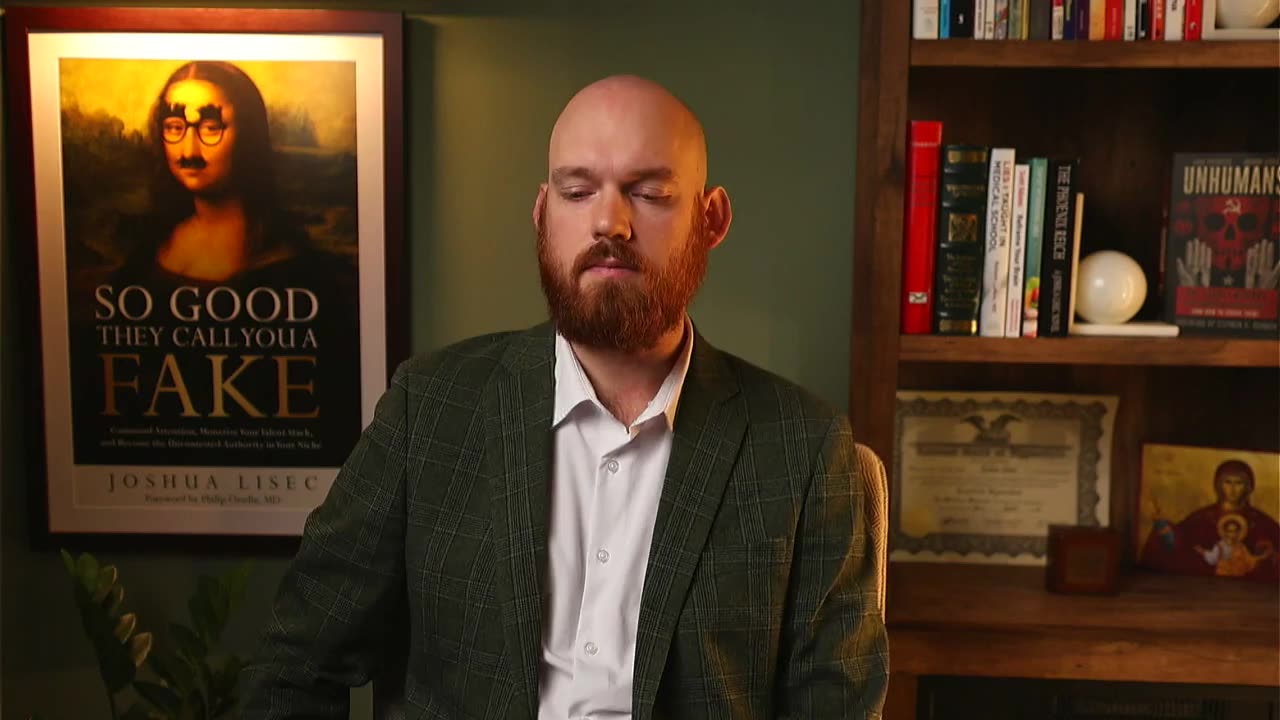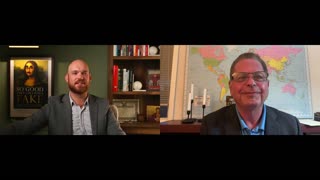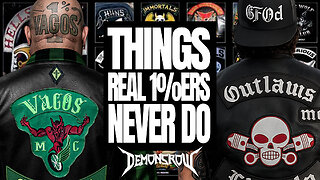Premium Only Content

How to Build Credibility ft. Anti-Persuasive Ways Liberals Think & Argue — Daily Persuasion Ep. 180
Would you like to write a persuasive BOOK? One that changes minds and influencers behavior for years to come? Start with a GOLDEN book idea. Let NEW YORK TIMES bestselling author Joshua Lisec teach you: https://lisecghostwriting.com/golden
ABOUT TODAY'S EPISODE:
Why do some people sound persuasive—yet immediately turn you off?
That’s the provocative question explored in Daily Persuasion with Joshua Lisec Ep. 180: How to Build Credibility ft. Anti-Persuasive Ways Liberals Think & Argue. In this eye-opening episode, Lisec dives deep into the unconscious habits that make people less persuasive, especially those commonly seen in liberal discourse.
Joshua Lisec, a New York Times bestselling author, ghostwriter of over 90 nonfiction books, and certified hypnotist, explains what most people miss: that being persuasive isn't just about what you say, but also what you avoid saying. In other words, if you want to know how to build credibility, start by learning the telltale signs of antipersuasion—those subtle (and not-so-subtle) habits that make others distrust you on sight.
The episode’s title, Anti-Persuasive Ways Liberals Think and Argue, isn't clickbait—it’s the thesis. Lisec argues that many liberals, in trying to signal intelligence or empathy, inadvertently engage in anti-persuasive behaviors that destroy their credibility. Using dozens of real-world persuasion examples, he breaks down the difference between authentic communication and the self-defeating patterns often found in liberal rhetoric.
From the overuse of “problematic” to NPR-inspired overpronunciation of menu items, Lisec illustrates how attempts to showcase moral or intellectual superiority can backfire. This kind of language, he explains, isn't just annoying—it’s anti-persuasive. If you’ve ever wondered why someone sounds smart but doesn’t feel trustworthy, this episode shows you why.
So what exactly is antipersuasion? In Lisec’s words, it’s anything that makes it harder for someone to say “yes” to you. And that includes using vague qualifiers like “to be fair” or self-elevating intros like “as a PhD in…” when no one asked. These phrases don’t enhance your argument—they damage your credibility.
Want to know how to establish credibility in conversation, client work, or content creation? Drop the jargon. Stop trying so hard. Lisec shares powerful persuasion techniques that work because they feel effortless—and because they don’t trigger red flags.
This episode is also a crash course in persuasion psychology. Liberals, says Lisec, often operate in echo chambers where dissent is seen as bigotry rather than disagreement. Without the “iron sharpens iron” dynamic of conservative spaces, many never have to defend their views. So when faced with logic or data, they reach for anti-persuasive tactics like name-calling, moral grandstanding, or invoking “settled science.” These aren’t just frustrating—they’re credibility killers.
If you’re a marketer, writer, coach, or consultant, this episode also unpacks how persuasive techniques used in advertising are often the opposite of what we see in political discourse. Where ads aim to persuade someone to do something, political influencers often shame or confuse people instead. It’s a masterclass in what not to do—and how to shift your language to connect instead of repel.
But this isn’t a liberal roast for the sake of it. Lisec emphasizes that the lesson here is universal: Whether you’re left, right, or center, stop using anti-persuasive language that undermines your credibility. That’s the first step to becoming a powerful communicator and influencer.
Looking for techniques of persuasion in writing that actually work? Pay attention to the patterns Lisec deconstructs in this episode. You’ll never read a viral tweet—or hear a cable news segment—the same way again.
So, if you’re ready to stop turning people off and start building real trust, watch Daily Persuasion Ep. 180 now. Learn the anti-persuasive habits to ditch, the persuasion psychology to adopt, and the liberal values that might be sabotaging your message—even if you’re not a liberal.
Because the first rule of influence is this: If people don’t believe you, nothing else matters.
-
 51:39
51:39
Daily Persuasion with Joshua Lisec
16 days agoCommercializing Conspiracies ft Kent Heckenlively, Vegas, the Deep State & UFO/UAP Disclosure—Ep 327
551 -
 48:57
48:57
Man in America
14 hours agoThe Sinister Reason They Put Fluoride in Everything w/ Larry Oberheu
313K73 -
 1:06:56
1:06:56
Sarah Westall
12 hours agoAstrological Predictions, Epstein & Charlie Kirk w/ Kim Iversen
71.9K37 -
 2:06:49
2:06:49
vivafrei
21 hours agoEp. 289: Arctic Frost, Boasberg Impeachment, SNAP Funding, Trump - China, Tylenol Sued & MORE!
254K190 -
 2:56:28
2:56:28
IsaiahLCarter
15 hours ago $7.95 earnedThe Tri-State Commission, Election Weekend Edition || APOSTATE RADIO 033 (Guest: Adam B. Coleman)
34.5K6 -
 15:03
15:03
Demons Row
11 hours ago $12.24 earnedThings Real 1%ers Never Do! 💀🏍️
51.8K19 -
 35:27
35:27
megimu32
14 hours agoMEGI + PEPPY LIVE FROM DREAMHACK!
169K14 -
 1:03:23
1:03:23
Tactical Advisor
18 hours agoNew Gun Unboxing | Vault Room Live Stream 044
255K40 -
 19:12
19:12
Robbi On The Record
19 hours ago $22.59 earnedThe Loneliness Epidemic: AN INVESTIGATION
83.1K104 -
 14:45
14:45
Mrgunsngear
1 day ago $144.91 earnedFletcher Rifle Works Texas Flood 30 Caliber 3D Printed Titanium Suppressor Test & Review
143K34